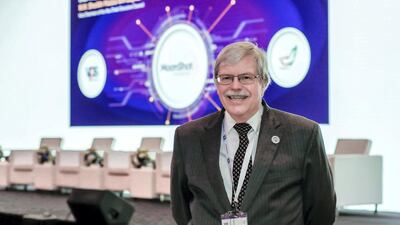The UAE must conduct more clinical trials into cancer treatments to improve survival rates in the country, health experts have warned.
Doctors said medications can react differently depending on an individual’s genetic makeup, making studies of local populations key.
Worldwide, up to 75 per cent of cancer sufferers do not react well to therapies meaning it is vital for pharmaceuticals to be tailored to the patient.
Drugs prescribed to Caucasian populations, for example, can have a very different impact when given to patients from the Middle East.
“When new therapies are developed you can’t assume that it will work in all parts of the world like China or India or the Middle East,” said Professor Stanley Hamilton, head of Pathology and Laboratory Medicine at the MD Anderson Cancer Centre in Texas, United States.
“The message is that the more therapies we come up with, the more we need to ensure that they are effective for this part of the world.”
The warning came as experts from around the world gathered in Abu Dhabi for the 2018 Moonshot initiative.
The research platform draws industry leaders from around the world with the aim of inspiring the next generation of scientists.
Speakers at the one-day conference highlighted that clinical trials showed responses to therapies varied depending on the ethnic group being treated.
Experts said drugs were most effective when tailored to local populations, and that there was a shortage of clinical trials taking place in the UAE.
____________
Read more:
Patients Offered Unnecessary Surgery By Non-specialised Surgeons, Say Abu Dhabi Doctors
Few Emiratis being screened leads to many dying from preventable colon cancer, doctor warns
____________
Anu Acharya, CEO of MapmyGenome, an Indian firm specialising in genetic testing, said it was not uncommon for patients to react differently to the same drug.
She said even individuals within the same population could have varying responses, meaning it was critical that more UAE trials were conducted and that Emiratis themselves agreed to participate in the research.
This “may be the reason why many of the cancer treatments are ineffective to patients in this part of the world,” she said.
“There are different kinds of individuals. Some individuals may not respond at all to a drug. Some may respond well and other may need an increased dose.
“There is a lot of Caucasian data and they have better precision in term of drugs. This is very important to have for the Emirati population.”
Giving a personal example Ms Acharya said her mother, who suffers from type 2 diabetes, had been prescribed the drug Metformin.
“It is the most common drug but she wasn’t improving,” she said. “It didn’t work for her and she needed to have the drug changed.
“The point is that each drug doesn’t work for everyone and there is no point in persisting in medication just because it works for everyone else.”
Dr Saad Kenderian, Assistant Professor of Oncology and Immunity and Director of Mayo Clinic’s T Cell Engineering Program in Minnesota, USA, said the latest cancer therapy breakthrough involved engineering a patients’ own immune cells to recognise cancer cells.
This type of therapy was approved by the US Food and Drug Administration last year after being proved to be effective with patients with blood cancer. To date, more than 1,000 patients have undergone the treatment.
Prof Hamilton said convincing patients in the UAE and wider Gulf region to participate in trials would also be a critical step forward.
“Clinical trial participation is only about four per cent,” he said. “We can help by setting up a research centre in the UAE.”
According to the Abu Dhabi Department of Health, cancer is the third most common cause of death in the emirate, accounting for 16 per cent of the total.
There were around 427 deaths caused by cancer in 2015, of which 35 per cent were nationals and 65 per cent were residents from abroad.

